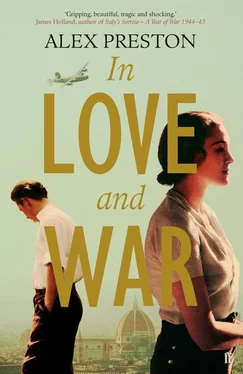He put his fork down, swirled the wine in his glass and sipped at it, not taking his eyes from me. He asked me which side I was on. I thought I could see where this was heading, but feigned innocence. He began a long and rather worn speech about the course of world history, consequentialism, the necessary conditions for evil, et cetera.
I let the silence settle after he’d finished and then told him I was on board. That whatever he was up to, I was with him. It turns out Goad is in, too. Bailey went to call for him and we sat up till late. Goad even drank a glass of Chianti, or half, looking rather sparkier than I’d seen for a while. He’s out of love with Fascism, he says. The Corporate State was still the ideal, but not the violence. The Fascists weren’t poets — look at Pavolini. Once a thoroughly decent writer, now just another of Il Duce ’s thugs. Now he smiled, and I realised it was the first smile I’d seen on that pinched, grey face since Fiamma, since Gerald, since everything turned to dust.
After dinner, Bailey led me back into his bedroom, Goad following with his glass of wine — a sight I found oddly funny. It was all so bizarre it was hard not to laugh. This vicar and his pale accomplice standing up to the might of Fascism. On the desk in Bailey’s room there was a shortwave W/T set. On the floor reams of paper fanned out from manila files; on the wall a map of Tuscany with numerous pins in and around Florence, some as far as Pisa and Lucca.
Bailey says he’s working with the Professor — Piero Calamandrei — to mould the rag-tag Resistance into a credible whole. Bailey and Goad are in charge of helping dissidents, refugees and deserters evade the tentacles of the State. The Resistance have a man in Rome, Filippo Caracciolo, who lets them know when new names are added to the list of official enemies. More information comes from local Blackshirts, who are bribed with a few jugs of wine at the Paszkowski Bar, a grappa or two. As soon as they know that a member of Giustizia e Libertà is in trouble, they ferry him or, just as often, her, to a safe-house. Bartali, the cyclist, pulls a wooden box behind him in which a man can crouch. When stopped, he claims the box is essential to his fitness for the Giro d’Italia. It is full of stones, he says, and opens the lid. The Blackshirts or carabinieri stand back and nod, the fugitive tucked snugly beneath a false bottom.
Recently they’ve been taking in Jews threatened with internment at the concentration camps in Campagna and Trieste, others who ducked out of sight during the eviction of July ’39. Florence’s bureaucrats and their henchmen have been more enthusiastic than most in circumscribing the lives of their Jewish residents, but their roll-calls and round-ups are nothing compared to those in the east. Over the past few weeks, Jews have been arriving from Fiume, Friuli, Trieste and all across the Julian March. Some are refugees from Austria and Germany; most fleeing the anti-Semitic officials of Balkan and Adriatic Italy. The boy I’d seen in the church a few nights earlier, Dino, was from a family of fishermen on the Isonzo River.
It was Ada who introduced Bailey to the Professor and his group of liberalsocialiste . He is now co-ordinating with Giustizia e Libertà cells in Milan and Turin to ferry the refugees under false papers to America, Palestine, Brazil. Sixty have been sent so far; fifty more housed in convents, abbeys, derelict church buildings in the city and Val di Pesa, Cardinal della Costa providing the keys and his blessings. Bailey and Goad told me all this as one bottle of wine, then another, was emptied, me sitting cross-legged on Bailey’s bed, Goad perched on the dressing table stool. Goad kept beaming at me, rubbing his hands and saying Just so and Very good . It grew late.
Bailey told me other things. The presence of the station provides cover for his shortwave communications with Turin and Milan, with the deserters who’d fled the city and were hiding in the wooded hills of Forlì-Cesena. The telephones were tapped — he knew this — and the security police had devices for monitoring radio signals, but the noise generated by the waves of Radio Firenze masked his messages. Was I, he asked, ready to take a more active role in his plans? Could I be relied upon not to give them all up?
I’m recording this early in the morning. I haven’t slept, haven’t been able to find my way back into In Love and War . I remember something my housemaster at Winchester said to me. I’d let down the house in some way — I think it was the time I was out in front in the school run, had stumbled and fallen and had to crawl to the finish. Twenty-fifth place, I recall. That evening, in his study, he’d steepled his fingers. We only know ourselves, he’d said, in crisis. Character is theoretical until we act. I think today, Esmond, you beheld yourself. Not quite the hero your father was, eh? He’d given me a narrow, nasty smile and dismissed me with a flick of his hand, gone back to pleasanter thoughts. Now I have a chance to do something Ada will admire, something for England, something that, if he ever knew about it, my father would be proud of, I think.
I still feel bloody windy, though. I keep thinking of that brave young man who broke a bottle over Carità’s head, grabbed his pudgy wrist in the entrance hall of the British Institute. Perhaps, in the end, those were my crises, my assessments. I didn’t do so badly.
Hitler’s arriving in Florence today. Musso is already here, encamped in the Palazzo Vecchio, banners fluttering over the ramparts, posters of his granite head on every wall. Blackshirts glower under the carved tabernacles on the street corners, polishing their revolvers. I’ve not been invited to meet the great men but Pavolini is in town and wants a chat. I intend to be sly, I think. Evasive. Play the part, spy-like. Now dawn is coming up like thunder, and I must go. Good morning, whoever-you-are, good morning.’
11 . A-Side:Alessandro Pavolini on the March on Rome and the Glorious Patria (35′ 21″)
B-Side:‘It’s February, and bitterly cold in the church apartments. There’s central heating at the via dei Forbici, and Ada and I have made a nest for ourselves there, piling rugs on the bed and looking out over the branches of the Villa Ventaglio, silhouetted with snow. The Professor comes to see us weekly, bringing other members of the Resistance with him. The persecution of the English, the crackdown on Communists and deserters, even the racial laws appear to have been forgotten as the Italians are buffeted with bad news from all sides: disaster in Greece; ignominy in North Africa; now British warships shell Genoa, RAF bombers hit Livorno. There are sandbags around the foot of Giotto’s Campanile, around Ammannati’s Neptune , which I, for one, wouldn’t mourn were it hit. They’ve constructed a wooden shelter under which David seems smaller, rather ashamed of his city’s nerves. The Brancacci Chapel, where Filippino learnt his craft, is cocooned in an asbestos bunker, closed up until peace breaks out.
Ada and I spend our time doing paperwork: small tasks which, when combined with the work of others who take far greater risks than we, will mean a family safely on an Aliyah Bet ship bound for Haifa, or a group of young men hidden with friends in the hills. We celebrated Hanukkah with Dino and his family. I gave him a catapult and a book of prints, Lippi’s St Jerome and Botticelli’s Venus among them. It’s not possible now to see the paintings in person: most of the galleries’ important works have been removed to storage. Underground vaults, or in villas in Fiesole, Pontassieve, Impruneta. Dino’s father is a quiet, intelligent man; he looks at the book carefully, nodding all the time, then passes it back to his son. His mother is chubby, sweetly smiling, and used her son’s catapult briefly to fire peanuts at Bailey and Goad. They have another son with the rebels in the Apennines.
Читать дальше












